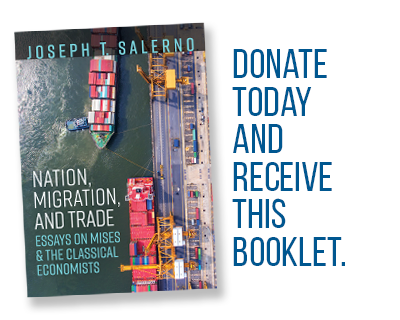As the Mises Institute launches it Fall Fundraising Drive this week, it is useful to reflect on what makes the Mises Institute so different from the thousands of other non-profits around the country that seek to change the world. There are no shortage of groups seeking funding from average people as they claim to work to advance their interests. Yet, unlike so many of those groups, the Mises Institute does not merely ask for your financial support or perhaps for you to march and shout slogans about complicated social phenomena that they have not equipped you to understand and evaluate for yourselves. Rather, the Mises Institute takes seriously the words of its namesake when he declared at the end of his book Socialism that “everyone carries a part of society on his shoulders; no one is relieved of his share of responsibility by others. And no one can find a safe way for himself if society is sweeping towards destruction. Therefore everyone, in his own interests, must thrust himself vigorously into the intellectual battle.”
As is clear to anyone who bothers to see, there is undoubtably a great intellectual struggle going on in our society. Just in the past week, thousands of protestors have taken to the streets demanding the government declare a climate emergency and implement a Green New Deal that entails sweeping new government powers and control over the economy. An army of “experts” and activists from numerous groups encouraged and organized these protests and the media has cheered them on. Thousands of children and their parents participated in the NYC Climate March after their schools declared that absences for the march would be excused.
 However, when one gets behind the enthusiasm for boldly declaring the world will end unless we hand the government even more control of our lives, it is clear that the vast majority of the participants in these marches are completely lacking in any knowledge about the complexities of climate science, not to mention the implications for the various policy proposals they are loudly bellowing for. It seems the only thing that matters is that civilization is in crisis and government action must be taken.
However, when one gets behind the enthusiasm for boldly declaring the world will end unless we hand the government even more control of our lives, it is clear that the vast majority of the participants in these marches are completely lacking in any knowledge about the complexities of climate science, not to mention the implications for the various policy proposals they are loudly bellowing for. It seems the only thing that matters is that civilization is in crisis and government action must be taken.
Mises, too, recognized that civilization itself can be threatened. In his 1929 book, Liberalism, he noted with alarm the growth of socialism around the world and concluded that “antiliberalism is heading toward a general collapse of civilization.” Yet, Mises did not simply proclaim to the masses that the world was in danger and everyone should do what he said to fix it. Rather, Mises dedicated his entire life to educating his fellow man about the science of economics and how applying that science within the political framework of liberalism leads to peace and prosperity. Rather than creating an army of followers who only knew the conclusions they were supposed to spout, Mises sought to empower people to be able to understand the workings of the social order and the crucial role of sound economic science.
The Mises Institute continues this important mission today and I have experienced and benefited from their work firsthand for over seven years now. As a curious high schooler searching for answers that no one seemed to have, Mises.org provided hours upon hours of lectures and reading material that opened me up to an exciting new world. I haven’t seen anything the same since.
Not only did the Mises Institute provide me access to a wealth of information via the enormous and free library at Mises.org, but while I was an undergraduate they provided my club, the Mercyhurst Liberty League, with numerous copies of David Gordon’s Introduction to Economic Reasoning to distribute to other curious students. Because I was familiar with his work via the Mises Institute, I was able to arrange for Dr. Robert Murphy, now a Senior Fellow with the Institute, to give a presentation via Skype to dozens of students in honor of Mises’ birthday.
Later, thanks to the generous support of donors to the Mises Institute, I was fortunate enough to attend Mises University, widely considered to be the best week of the year, twice. While there, I met numerous other curious men and women, ranging from high schoolers to people already leading successful careers who were all there because they desired to understand the crucial role that sound economics and liberalism play in our society. I made friends that I have continued to keep in touch with to this day.
Many groups ask for your help to “save the world.” Many groups are happy to take your financial resources or your time to march and shout slogans. Very few groups dedicate themselves to helping you understand the crucial role that economics plays in social life and why it is important for human flourishing that a liberal society be preserved. If you are able, consider a donation to the Mises Institute today to help them carry on their important work. Remember, in the words of Mises, “whether he chooses or not, every man is drawn into the great historical struggle, the decisive battle into which our epoch has plunged us.”


